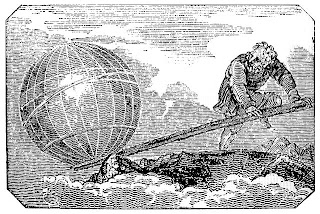Wednesday, December 5, 2012
8. Archimedes System of Levers and Pulleys
Born in 287 BC in Syracuse, Sicily, Archimedes grew to become one of the founding fathers of modern physics. One of his particular areas of interest was in mechanics, especially involving levers and pulleys. While rudimentary levers and pulleys had been used as tools for centuries, Archimedes was the first to attempt to quantify and define them. Famously quoted as saying, “Give me a lever long enough and a place to stand, and I can move the Earth,” Archimedes research culminated in many basic relationships that are still used in physics classes (Strong and Davis 220). These small mechanisms allowed for enormous loads to be transported with relative ease; more importantly, however, they also form an excellent model of synthesis. In the instance of the lever, the actual lever itself can do very little on its own, but requires a fulcrum to be able to function at full capacity. Nor can a single pulley provide a great difference in mechanics, but a system of pulleys can allow a single individual to move an enormous load. Similarly, a single idea, no matter how interesting it may be, can do very little on its own. It is only when placed in conjunction with other, complementary ideas that a truly functional system can be created.
Subscribe to:
Post Comments (Atom)

No comments:
Post a Comment